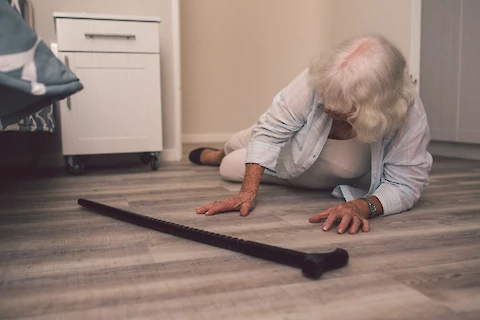
September marks National Fall Prevention Month, a time to highlight the vital safety considerations for households with senior residents. As our loved ones age, understanding the risks and prevention measures associated with falls becomes increasingly important. Whether it's adapting the home for improved safety or knowing how to respond if a fall does occur, being well-informed can make a significant difference for seniors. With a better understanding of the risks and how falls occur, you can make strides to prevent falls for your senior loved one.
Understanding the Risks of Falls
Falls, often viewed as minor incidents, pose a significant threat to seniors' health. According to the CDC, each year, three million seniors are treated for fall injuries in the United States. The danger lies not only in the immediate physical harm but also in the longer-term effects, such as decreased mobility, loss of independence and psychological distress.
Common Fall Risks for Seniors
Several factors in a senior's living environment could contribute to falls. Everyday items like loose rugs or clutter can turn hazardous, and hard-to-reach cabinets may encourage precarious balancing acts. Inadequate lighting, especially in areas such as staircases and bathrooms, can also add to the risk. Obstacles or uneven surfaces may cause trips and falls, too. Awareness of these risks is the first step in creating a safer home environment for our loved ones.
Importance of Seeking Medical Attention After a Fall
Falls should never be taken lightly. Even a seemingly mild tumble can cause hidden injuries like fractures or internal bleeding. More subtly, a fall can exacerbate an existing condition or lead to fear of falling again. This causes seniors to limit their activities and movements. Thus, you need to seek immediate medical attention following any fall to ensure no underlying issues go undiagnosed.
How to Care for a Senior After a Fall
Caring for a senior post-fall requires patience and consideration. It involves creating a safer home environment, free from potential fall risks mentioned earlier. Installing grab bars, improving lighting and removing clutter can significantly decrease fall hazards. You should also encourage regular, gentle exercise to maintain strength and balance and open communication to understand their fears and concerns. However, always check with your senior loved one's doctor before undertaking new exercises.
Senior Helpers Tri-Cities and SE Washington Assists Seniors With Daily Activities
Knowledge and preparation are crucial in preventing falls and ensuring the well-being of our seniors. As we mark National Fall Prevention Month, let's commit to creating safer environments and providing the care our seniors deserve. Senior Helpers Tri-Cities and SE Washington are dedicated to providing comprehensive support to seniors and their families in Kennewick, Walla Walla, Richland, Pasco and Clarkston. Our team of experienced care professionals understands the unique challenges associated with fall risks and prevention in seniors. We help create safer living spaces and provide care customized to suit individual needs and conditions, ensuring seniors maintain their independence while staying safe. Reach out to Senior Helpers today, and let's make our homes safer for our loved ones.